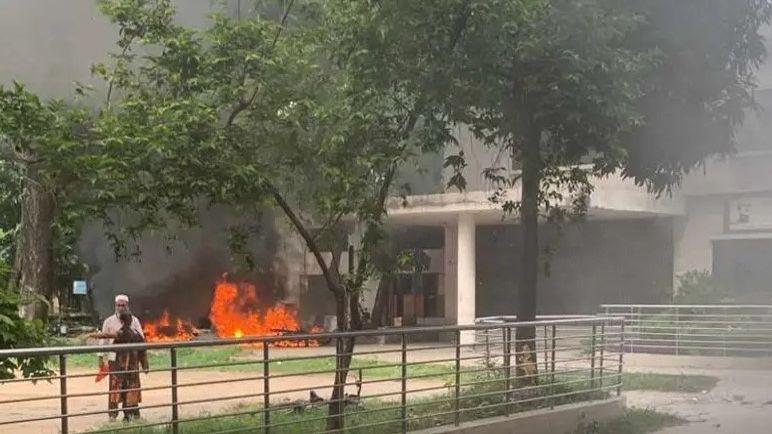Bangladesh issues high security alert as deadly protests escalate

- Published
A High Security Alert has been issued for the whole of Bangladesh, as violent clashes between students and police continue.
The capital Dhaka is in the midst of a near-total internet blackout, with phone lines also down.
On Thursday evening, several thousand protestors stormed the state broadcaster BTV, vandalising furniture, smashing windows and lights and setting parts of it on fire.
Bangladesh's information minister told the “óĻó“«Ć½ that broadcasts had been stopped and most employees had left the building in the capital.
A post on BTV's official Facebook page had earlier warned "many" were trapped inside the building, and appealed for help from the fire service to put the blaze out.
A senior BTV journalist, who didnāt want to be named, told the “óĻó“«Ć½: "The situation was so bad we didnāt have any other option but to leave the place. Some of our colleagues were trapped inside. I donāt know what happened to them."
Prime Minister Sheikh Hasina appeared on the network on Wednesday night, appealing for calm after days of violent protests which have left at least 19 people dead, possibly many more, and hundreds injured.
Students have been holding rallies demanding change to a system which reserves a third of public sector jobs for the relatives of veterans of the countryās war for independence from Pakistan in 1971.
The students are arguing that the system is discriminatory, asking for recruitment based on merit.
The government has been trying to quell the protests, on Thursday switching off the country's mobile internet in an attempt to slow the students.
Instead, it became the deadliest day so far, according to news agency AFP. According to its count citing hospitals, a total of 32 people have died during the protests.
The “óĻó“«Ć½'s Bengali service has confirmed 19 deaths so far - 13 of them on Thursday. Among the dead was a 32-year-old journalist for the Dhaka Times.
Sheikh Hasina had condemned protesters' deaths as "murder" in her Wednesday television appearance, but her words were largely dismissed by protest organisers, who rejected government offers of talks.
"The government has killed so many people in a day that we cannot join any discussions in the current circumstances," said Nahid Iqbal, a leader of the anti-quota protest.
Another student, Aleem Khan, 22, told the “óĻó“«Ć½: "The Prime Minister is asking for an end to the violence with one hand whilst, with the other hand, attacking students using pro-ruling party groups and the police."
Thursday saw tear gas and rubber bullets deployed by officers, as students created human blockades in the streets.
The students who stormed BTV had earlier "torched" a police station, according to an official at the network.
"They chased the police officers when they took refuge at the BTV office," the official told AFP. "Angry protesters then caused mayhem here."
Elsewhere, “óĻó“«Ć½ Bengali spoke to a group of medical students who were taking shelter inside a medical college compound after they were attacked by pro-ruling party groups.
One of the students, Sumi, told the “óĻó“«Ć½: āI am here to protest against discrimination within the civil service and now that so many students have been killed by the police, I am also protesting against that.
"Our protest is peaceful, but the way in which we were attacked made me feel like we were going to be killed by pro-ruling party groups."